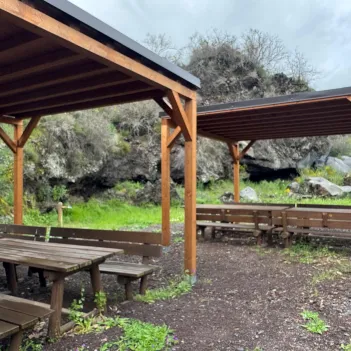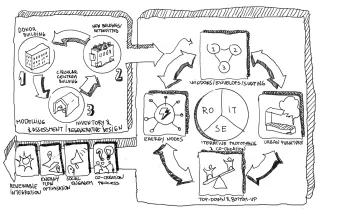SET-PED
Synergizing Buildings Renovation and Regenerative Urban Furniture to Co-create PED Ecosystem

- Category
- Project
- Call
- DUT Call 2023
- Duration
- –
- Project coordinator
- University of Catania
The SET-PED project tackles the urgent challenge of urban transformation toward climate neutrality, focusing specifically on integrating energy-efficient building renovations with regenerative urban furniture. It addresses key gaps in current Positive Energy District (PED) approaches, such as the lack of circular, climate-adapted renovation strategies, and the untapped potential of urban furniture as both energy nodes and social catalysts.
The project investigates how to transform urban public spaces using bio-based materials, recycled resources, and community co-design processes to improve local energy resilience and inclusivity. This responds to broader issues of energy poverty, social fragmentation, and underutilization of renewable energy in the built environment, especially in vulnerable neighborhoods.
SET-PED will co-develop, prototype, and test climate-adapted renovation methods and multifunctional smart urban furniture in three real-life environments: Mascalucia (Italy), Eskilstuna (Sweden), and Bucharest Sector 6 (Romania). These interventions include modular kits integrating solar PV, and recycled batteries, designed through a participatory co-creation process with local stakeholders. The project leverages circular economy principles by reusing local waste materials, creating adaptable, scalable energy solutions that foster community engagement and well-being. Modeling and simulation will be used to assess performance and optimize energy flows. The integrated design will also create replicable pathways for PED development across Europe.
SET-PED will deliver three main outcomes:
(1) a modular kit and manual for self-organized smart urban furniture creation;
(2) digital tools to support circular renovation and PED integration; and
(3) co-creation-based replication strategies. Impacts include improved energy resilience, greater social inclusion, enhanced public space usability, and increased stakeholder empowerment. By testing in diverse climates and contexts, SET-PED ensures high replicability and relevance for future climate-neutral cities.
Italy
Romania
Sweden
Asociatia IntreVecini, Bucharest Sector 6, Dalarna University, Eskilstuna kommun, Imottesjo, Shared City Foundation, University of Palermo, Urbasofia
Comune Di Mascalucia (Catania), Midsummer AB

© SET-PED
Links
Contact
Rosaria Volpe
rosaria.volpe@unict.it